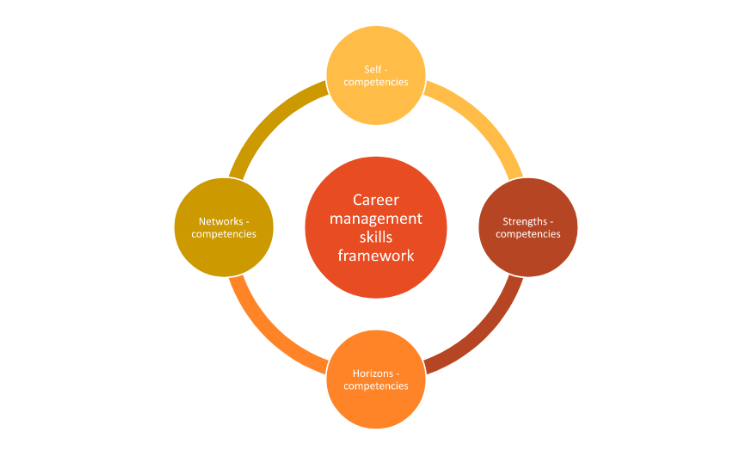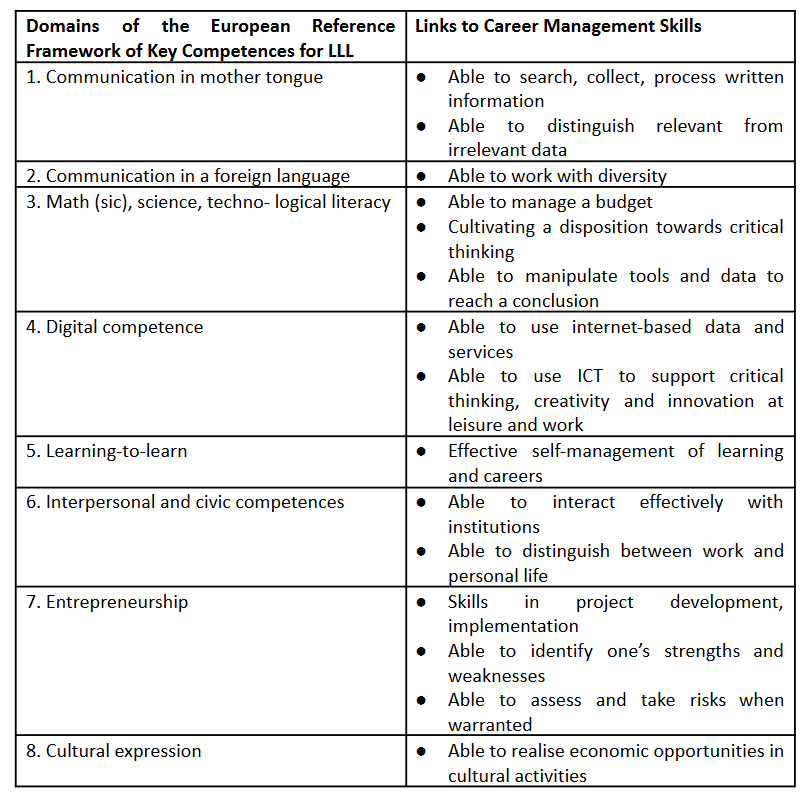What are career management skills (CMS)?

Career competences are competences for self-understanding and self-development; for exploring life and the worlds of learning and work; and for dealing with life, learning and work in periods of change and transition. Career Management Skills (CMS) enable you to manage your individual life paths in education, training and work across the lifespan.
They include:
- Planning your career, and setting goals and objectives;
- Developing a strategy for your career;
- Developing an action plan to deliver on it, including developing the skills required to succeed in your chosen career; and
- Evaluating your progress against your goals.
The Council of the European Union’s resolutions of 2004 and 2008 highlight the need to equip citizens with the skills to manage their learning, their careers and transitions within education, training and work. The skills required to effectively manage these transitions into and within education, training and work are collectively known as Career Management Skills (CMS).
Career management skills refer to a whole range of competencies which provide structured ways for individuals and groups to gather, analyse, synthesise and organise self, educational and occupational information as well as the skills to make and implement decisions and transitions. (European Lifelong Guidance Policy Network )
Video introduction to CMS: https://youtu.be/39B8QlPghWs
Development CMS skills can equip you to:
- access and effectively use the full range of career management products and services at a time and place that suits your needs;
- identify opportunities to develop your learning goals and employability skills;
- understand how the labour market works: how to find a job; to appreciate how and why industries and individual jobs within them are changing; and what sort of skills you need to progress;
- identify how you can progress within the workplace;
- be better able to take career decisions, to manage change and uncertainty by forward planning and to make confident choices for yourselves.
What are the competences that you need in order to effectively manage your career in a lifelong perspective? How can such competences be learnt? What should you know in order to successfully advance your career?
To support the implementation of CMS there have been a number of frameworks that have been created in different countries (Hooley et al., 2013).
There have been a number of attempts to define a list of career management skills. The Career management skills framework Scotland provides a concrete example of this, listing four areas of competencies:

Source: Own elaboration
What kind of professional do you want to be?
- Self – competencies that enable individuals to develop their sense of self within society,
- Strengths – competencies that enable individuals to acquire and build on their strengths and to pursue rewarding learning and work opportunities,
- Horizons – competencies that enable individuals to visualise, plan and achieve their career aspirations throughout life,
- Networks – competencies that enable individuals to develop relations and networks of support
CMS framework to connect with the European Reference Framework of Key Competences for Lifelong Learning, as following (Sultana, 2011) :


References
Hooley, T., Watts, A. G., Sultana, R. G. and Neary, S. (2013). The ‘blueprint’ framework for career management skills: a critical exploration. British Journal of Guidance & Counselling, 41(2): 117-131.
Sultana, Ronald G. Learning career management skills in Europe: A critical review. January 2011 Journal
of Education and Work 25(2):1-24

